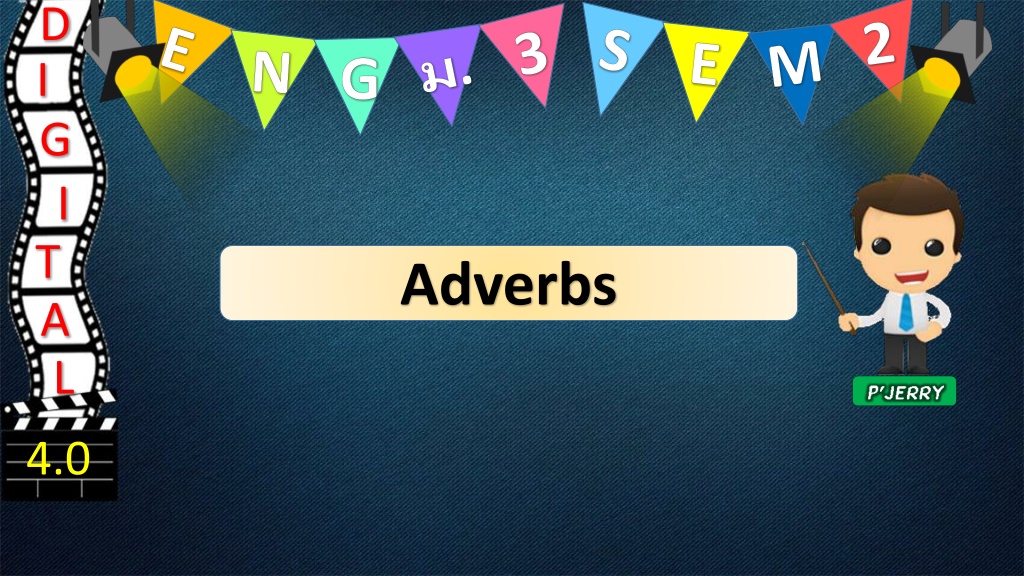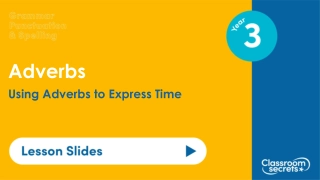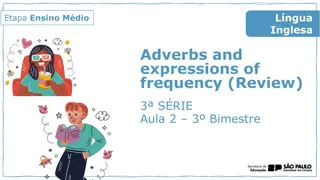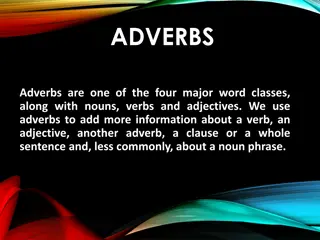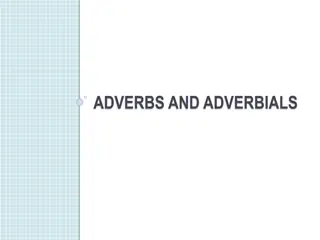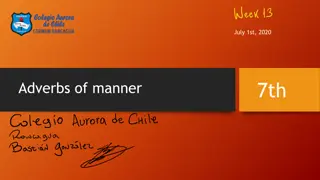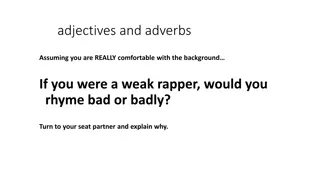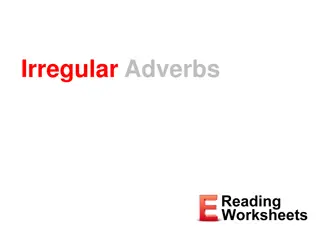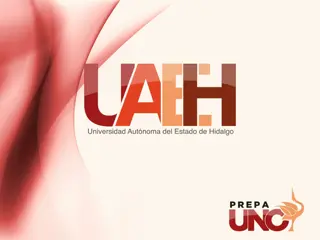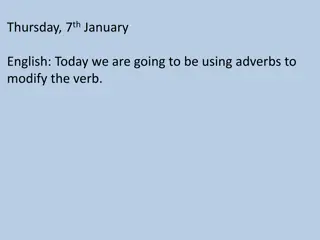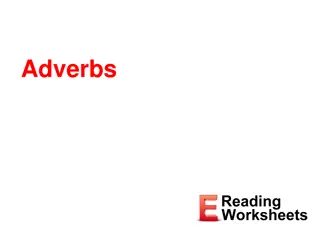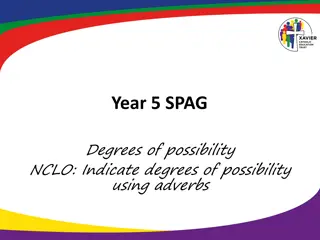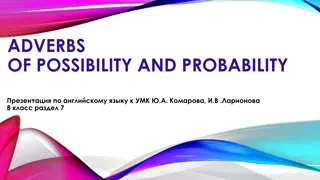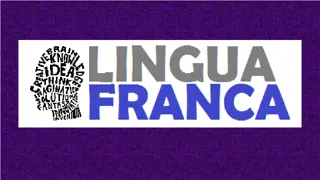Understanding Adverbs in English Grammar
Explore the world of adverbs in English grammar through this comprehensive guide. Learn how adverbs describe actions and their various forms, including regular and irregular adverbs. Discover how adverbs can have the same form as adjectives and how intensifiers like "very" and "really" enhance the strength of adjectives and adverbs. Dive into frequency adverbs that express how often something occurs, and understand where to place them in sentences. Unravel the nuances of adjectives that resemble adverbs but serve different functions. Enhance your language skills with practical examples and clear explanations.
Download Presentation

Please find below an Image/Link to download the presentation.
The content on the website is provided AS IS for your information and personal use only. It may not be sold, licensed, or shared on other websites without obtaining consent from the author. Download presentation by click this link. If you encounter any issues during the download, it is possible that the publisher has removed the file from their server.
E N D
Presentation Transcript
D I G E M 2 . 3 S E N G I T A Adverbs L 4.0
D I G ENG M.3 Sem. 2 Grammar Adverbs An adverb describes an action (a verb), saying how, when or where something happens. The girl was sitting uncomfortably on the floor. I ll see you tomorrow. Wait outside. I T A L 4.0
D I G ENG M.3 Sem. 2 Grammar Adverbs FORM adjective. Adjectives ending e dope e. Adjectives ending in y change -y to i. uncomfortable uncomfortably careful carefully happy really I Some of manner (how) add -ly to the T A L happily real 4.0
D I G ENG M.3 Sem. 2 Grammar Adverbs irregular adverbs Some adverbs have an irregular form, e.g. good well. I T A L 4.0
D I G ENG M.3 Sem. 2 Grammar Adverbs adverbs with the same form as adjectives early fast hard wrong Hard and hardly are often confused. Hardly means almost not . Hard isan adverb form meaning using a lot of energy . I can hardly hear you! I high late low right T A L Are you working hard? 4.0
D I G ENG M.3 Sem. 2 Grammar Adverbs adjectives that look like adverbs Some adjectives ending -ly look like adverbs but are not, e.g. friendly, lovely, lonely, likely, lively, silly. I T A L 4.0
D I G ENG M.3 Sem. 2 Grammar Adverbs frequency adverbs These describe how often something happens. People often think that bats are birds, but they are mammals. 0% 10% 25% never rarely usually always I T A 75% sometimes 90% 100% often L 4.0
D I G ENG M.3 Sem. 2 Grammar Adverbs frequency adverbs Put the frequency adverb between the subject and verb, but after be. A painting often tells a story. What sort of films do you usually go and see? Cartoon films are usually entertaining. I T A L 4.0
D I G ENG M.3 Sem. 2 Grammar Adverbs intensifiers Adverbs like very, really, extremely are used to make adjectives or adverbs stronger. I think this film is really terrible. Everyone has worked extremely carefully. I T A L 4.0
D I G ENG M.3 Sem. 2 Grammar Adverbs too, very Too means more than is necessary, very means a lot. Compare the meanings: I m too tired, I can't work any more. This is a very interesting painting. I T A L 4.0
D I G ENG M.3 Sem. 2 Grammar Adverbs too, very Too is often used with to-infinitive to explain why something is not possible. I m too tired to work. I T A L 4.0
D I G ENG M.3 Sem. 2 Grammar Adverbs well, ill, bad, badly Well and badly are adverbs and describe how an action is performed. She writes well. Well and ill are adjectives describing health I don't feel well. With verbs like, seem, feel we do not use an adverb. This fish smells bad. I T A He plays tennis badly. You look ill. L 4.0 That looks good.
D I G ENG M.3 Sem. 2 Grammar Adverbs Exercise 1 : Decide whether the words underlined are acting as adjectives or adverbs. a. Some people think modern paintings are difficult . adjective b. They write explanations of their work which can seem unnecessary. . c. They may not seem to have very much connection with the art. . I T A L 4.0
D I G ENG M.3 Sem. 2 Grammar Adverbs Exercise 1 : Decide whether the words underlined are acting as adjectives or adverbs. d. Still, if the work seems interesting then it is worth looking at. . e. They find them confusing because they are not pictures . . f. At least, they say, a photo does show the real world. . I T A L 4.0
D I G ENG M.3 Sem. 2 Grammar Adverbs Exercise 1 : Decide whether the words underlined are acting as adjectives or adverbs. g. It s also hard to persuade them that the artist worked hard. . h. Some modern painting could easily have been painted by a child. . I T A L 4.0
D I G ENG M.3 Sem. 2 Grammar Adverbs Exercise 1 : Decide whether the words underlined are acting as adjectives or adverbs. i. Artists sometimes make the situation more difficult. . j. They say that a good photograph would be better. . I T A L 4.0
D I G ENG M.3 Sem. 2 Grammar Adverbs Exercise 2 : Complete the sentence with an adverb formed from the adjective in brackets. a. The play begins rather (slow) slowly with a scene at a bus stop. b. This is a (true) .. great book. Go out and buy it today. c. Just as you think the main characters are going to live (happy) ever after, the film takes an unexpected twist. I T A L 4.0
D I G ENG M.3 Sem. 2 Grammar Adverbs Exercise 2 : Complete the sentence with an adverb formed from the adjective in brackets. d. John's guitar playing is pretty good, but he sings so (bad) .. that just wanted him to stop. e. This book is (beautiful) .. written, but in the end the story is disappointing. f. Jim Carrey in the main role is (unbelievable) .. funny. I T A L 4.0
D I G ENG M.3 Sem. 2 Grammar Adverbs Exercise 2 : Complete the sentence with an adverb formed from the adjective in brackets. g. The whole show was (real) .. entertaining and the singers and dancers showed a lot of enthusiasm. h. This is an (incredible) .. good album, with a lot of fantastic tracks. I T A L 4.0
D I G ENG M.3 Sem. 2 Grammar Adverbs Exercise 3 : Put the frequency adverb in brackets into the most appropriate space in the sentence. Decide whether the statement describes a good listener, or a bad listener. a. I often finish .. sentences for other people. (often) when they talk to me. Good or bad listener? b. If I don't like a person's voice, I pay attention to them. (never) Good or bad listener? I T A L 4.0
D I G ENG M.3 Sem. 2 Grammar Adverbs Exercise 3 : Put the frequency adverb in brackets into the most appropriate space in the sentence. Decide whether the statement describes a good listener, or a bad listener. c. I interrupt people before they have finished what they are saying. (rarely) Good or bad listener? d. When people talk to me, I . look at the floor. (sometimes) Good or bad listener? I T A L 4.0
D I G ENG M.3 Sem. 2 Grammar Adverbs Exercise 3 : Put the frequency adverb in brackets into the most appropriate space in the sentence. Decide whether the statement describes a good listener, or a bad listener. e. Other people seem to be comfortable when they talk to me. (usually) Good or bad listener? f. I try to give people my complete attention when they speak to me. (always) Good or bad listener? I T A L 4.0
D I G ENG M.3 Sem. 2 Grammar Adverbs Exercise 3 : Put the frequency adverb in brackets into the most appropriate space in the sentence. Decide whether the statement describes a good listener, or a bad listener. g. I try to be sympathetic when people talk about their problems. (usually) Good or bad listener? h. I laugh at what people say to me and upset them. (sometimes) Good or bad listener? I T A L 4.0
D I G ENG M.3 Sem. 2 Grammar Adverbs Exercise 4 : Make an adverb ending in -ly from the word in brackets, and use it to complete the sentence. a. Cholera is a disease spread by dirty water, either when people drink the water, or eat food which has been washed in the water, and not property . cooked. (proper) b. , until the mid 19th century, people believed that the disease travelled through the air. (unfortunate) I T A L 4.0
D I G ENG M.3 Sem. 2 Grammar Adverbs Exercise 4 : Make an adverb ending in -ly from the word in brackets, and use it to complete the sentence. c. In the crowded cities of 19th-century Britain, cholera spread . (easy) d. Most doctors believed that fresh air and a better diet would prevent the disease. (wrong) I T A L 4.0
D I G ENG M.3 Sem. 2 Grammar Adverbs Exercise 4 : Make an adverb ending in -ly from the word in brackets, and use it to complete the sentence. e. Huge fires were lit in the streets to drive away the infection, and the clothes of victims were also burned. (usual) f. The streets were also cleaned with powerful chemicals. (thorough) I T A L 4.0
D I G ENG M.3 Sem. 2 Grammar Adverbs Exercise 4 : Make an adverb ending in -ly from the word in brackets, and use it to complete the sentence. g. However, people continued to suffer . (dreadful) h. In 1854, a doctor in London, John Snow, proved that cholera spread through infected drinking water. (definite) I T A L 4.0
D I G ENG M.3 Sem. 2 Grammar Adverbs Exercise 4 : Make an adverb ending in -ly from the word in brackets, and use it to complete the sentence. i. He did this by collecting statistics about infection in one part of London. (careful) j. He managed to prove that in an area where deaths from cholera were highest, the water was responsible for cholera infection. Improvements made to sewers and supplies of drinking water later led to a decrease in deaths from cholera. I T A L (entire) 4.0
D I G ENG M.3 Sem. 2 Grammar Adverbs Exercise 5 : Use the prompts to make a question with the frequency adverb in brackets. a. you / take the lead in group discussion? ( usually ) .......Do you usually take the lead in discussions . .. ? b. you / feel that nobody is interested in what you say ? ( sometimes ) ? I T A L 4.0
D I G ENG M.3 Sem. 2 Grammar Adverbs Exercise 5 : Use the prompts to make a question with the frequency adverb in brackets. c. you / feel / unable to say anything interesting ? ( sometimes ) ? d. you / find ways of keeping other people s attention ? ( usually ) ? I T A L 4.0
D I G ENG M.3 Sem. 2 Grammar Adverbs Exercise 5 : Use the prompts to make a question with the frequency adverb in brackets. e. you / change / your opinion after you hear what others say? ( often ) ? f. you / avoid saying what you really think ? ( often ) ? I T A L 4.0
D I G ENG M.3 Sem. 2 Grammar Adverbs Exercise 5 : Use the prompts to make a question with the frequency adverb in brackets. g. you / listen carefully to what all the others are saying ? ( always ) ? h. you / encourage other members of the group to speak ? ( always ) ? I T A L 4.0
D I G ENG M.3 Sem. 2 Grammar Adverbs Exercise 6 : Underline the correct word. a. I recommend this book. I think it's too / very interesting. b. This book has more than 700 pages, so it's too / very long to read in an afternoon! c. This is a too / very unusual film, and probably won t appeal to everyone. d. What I like most about this book is that the characters are too / very true-to-life. I T A L 4.0
D I G ENG M.3 Sem. 2 Grammar Adverbs Exercise 6 : Underline the correct word. e. I couldn't understand this book at all! The language is just too / very difficult. f. I liked this film because it is too / very funny, and it made me laugh a lot. g. This film is too / very romantic, and it really made me cry! h. There are some too / very good scenes in this film, but on the whole I didn't like it. I T A L 4.0
D I G ENG M.3 Sem. 2 Grammar Adverbs Exercise 7 : Decide whether the word underlined is used as an adjective or adverb. a. We had a lovely time in the hotel. .adjective .. . b. You certainly never feel lonely in a place like this! . . c. And they spoke to us very politely. . . I T A L 4.0
D I G ENG M.3 Sem. 2 Grammar Adverbs Exercise 7 : Decide whether the word underlined is used as an adjective or adverb. d. We would certainly thoroughly recommend it. . . e. The night life is also very lively. . . f. All the staff greeted us warmly. . . I T A L 4.0
D I G ENG M.3 Sem. 2 Grammar Adverbs Exercise 7 : Decide whether the word underlined is used as an adjective or adverb. g. Most people we met in the town were very friendly. . . h. We are very likely to go back next year. . . I T A L 4.0
D I G ENG M.3 Sem. 2 Grammar Adverbs Exercise 8 : Complete the sentence with well, ill, bad, badly, hard, or hardly . a. Last Thursday I woke up feeling ill. . . b. When I got up I realized I could .. walk. c. I didn't feel at all .. but I had to go to the doctor s. d. My left ankle seemed to be .. swollen . I T A L 4.0
D I G ENG M.3 Sem. 2 Grammar Adverbs Exercise 8 : Complete the sentence with well, ill, bad, badly, hard, or hardly . e. I had exercised .. in the gym the night before. f. I found it .. to walk there, but I managed it in the end. g. The .. news was that I needed an x-ray and had to go to the hospital. h. The doctor there told me there was nothing seriously wrong. I could .. believe it! I T A L 4.0
D I G ENG M.3 Sem. 2 Grammar Adverbs confusing adjectives and adverbs: fast, hard, late Some words can be both adjectives and adverbs. If you've got a fast car, why don't you drive fast? More examples: daily early hard late loud* monthly weekly well yearly I T A L 4.0
D I G ENG M.3 Sem. 2 Grammar Adverbs Exercise 9 : Put in suitable words. 1. The Times is a . paper ( but it isn't published on Sundays ). 2. Please try to come home . for once. 3. I get paid . , on the 30th or 31st. 4. It s getting . , so I 'm going to stop work. 5. She speaks English very . She must have spent time in an English-speaking country. I T A L 4.0
D I G ENG M.3 Sem. 2 Grammar Adverbs Exercise 9 : Put in suitable words. 6. The postman's . I wasn't expecting him for another hour. 7. We usually have . meetings, but there were only two in September. 8. If you want me to work . , you 'll have to pay me more. 9. Don't talk so . It hurts my head. 10. I 'm sorry I 'm . My train arrived very . . I T A L 4.0
D I G ENG M.3 Sem. 2 Grammar Adverbs Exercise 9 : Put in suitable words. 11. I can't stand . noise . 12. Fresh milk is delivered . to the local shops. 13. She s becoming very . to live with. 14. How are you? Very . , thanks. I T A L 4.0
D I G ENG M.3 Sem. 2 Grammar Adverbs Exercise 10 : Adjective or adverb? Put in the correct word. 1. I haven't got much money. If I travel this year, I 'll have to do it . ( cheap / cheaply ) 2. I felt her arm to see if any bones were broken. ( gentle / gently ) 3. Her hair is so - like a baby 's hair. ( soft / softly ) 4. Judy doesn't speak very I often have trouble understanding her. ( clear / clear ) 5. You re looking very today. ( happy / happily ) I T A L 4.0
D I G ENG M.3 Sem. 2 Grammar Adverbs Exercise 10 : Adjective or adverb? Put in the correct word. 6. I 'm sorry, but you 're wrong. ( complete / completely ) 7. He may appear , but in fact he s intelligent. ( stupid / stupider ; extreme / extremely ) 8. That fish smells . ( bad / badly ) 9. Please carry this very ( careful / carefully ) 10. Tim was in an accident yesterday, but he wasn't hurt. ( bad / badly ) I T A L 4.0
D I G ENG M.3 Sem. 2 Grammar Adverbs Exercise 11 : Write the sentences with the adverbs in the correct positions. 1. That girl spends hours in the bathroom. ( always ) .. . 2. We have been invited to Simpson s parties. ( never ) .. . 3. We got home very late. ( last night ) .. . I T A L 4.0
D I G ENG M.3 Sem. 2 Grammar Adverbs Exercise 11 : Write the sentences with the adverbs in the correct positions. 4. The water was too cold for swimming. ( usually ) .. . 5. Somebody was trying to open the door. ( definitely ) .. . 6. Life is hard. ( sometimes ) .. . I T A L 4.0
D I G ENG M.3 Sem. 2 Grammar Adverbs Exercise 11 : Write the sentences with the adverbs in the correct positions. 7. I have been to Jamaica . ( never ) .. . 8. I know some French, and speak Russian. ( very badly ) .. . 9. He puts tomato ketchup on cornflakes. ( even ) .. . 10. Cherry needs somebody help her. ( probably ) I T A L 4.0
